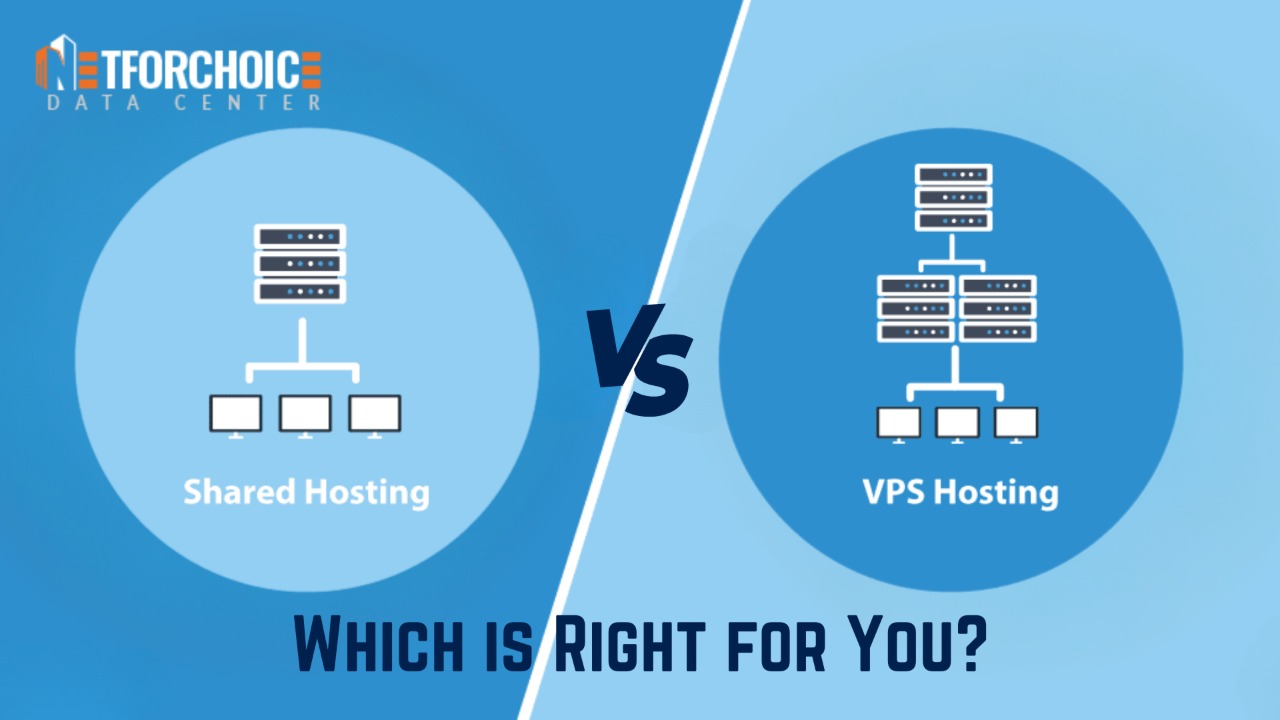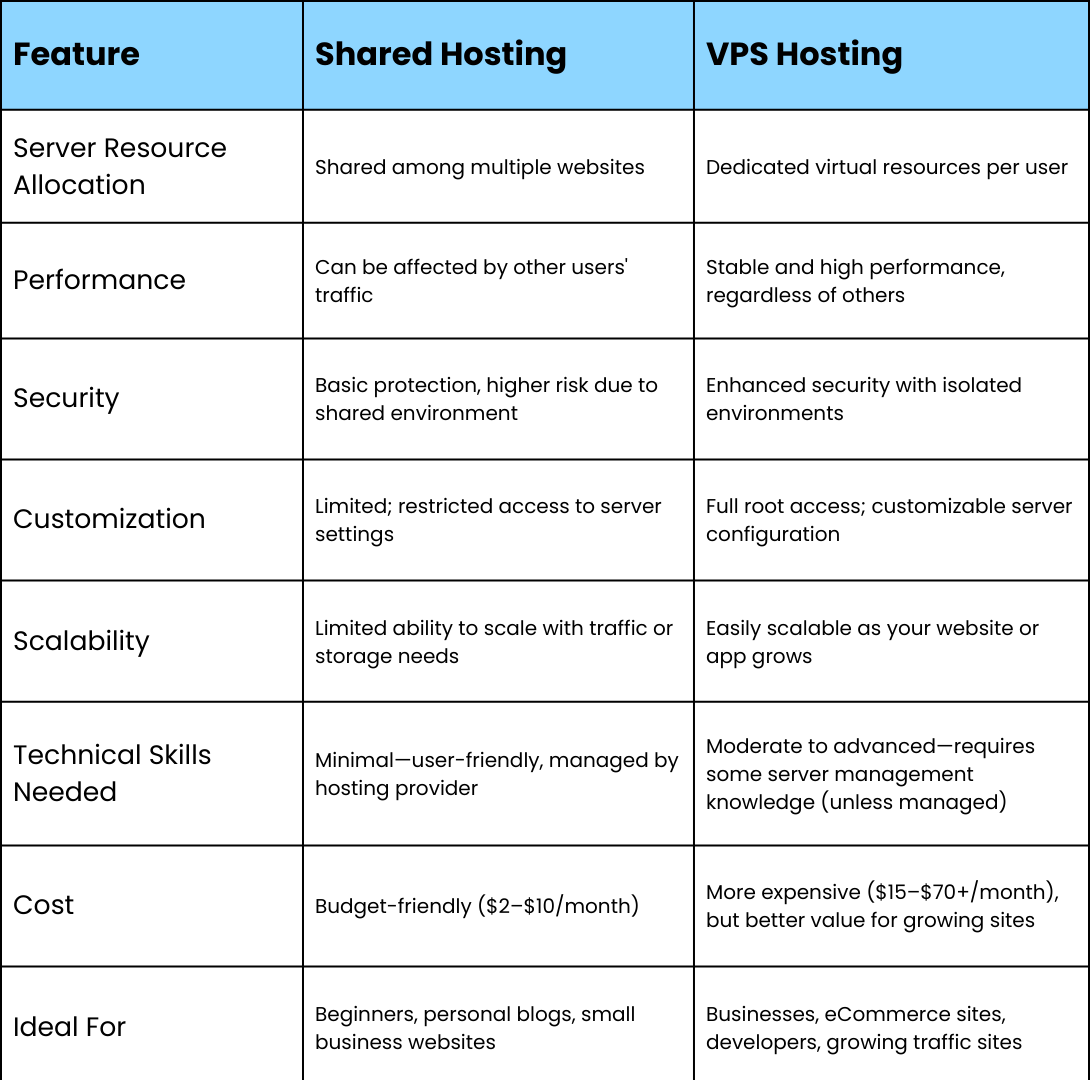Shared Hosting vs. VPS Hosting: Which is Right for You?

When you first start building your website, one of the first decisions you will need to make is what web hosting solution to go with. If you have done any research in the area of hosting, then somewhere you will definitely have come across two very common hosting solutions: shared hosting and VPS hosting. Both options will allow you to get your website up and running; however, they are very different in terms of performance levels, control, security, and scalability. Your success online is greatly dependent on which hosting plan you choose, whether you are starting a blog, building a business website, or running an eCommerce website. In this blog, we will be going into detail about shared hosting and VPS hosting to get perspective on what is best for you.
What is shared hosting?
How Shared Hosting Works? Shared hosting is like renting a bed in a dorm room. Your website shares server space with many other sites, all drawing from the same pool of resources—CPU, RAM, and storage. It’s a cost-effective option, especially for beginners.
Pros of Shared Hosting
- Affordable: Ideal for individuals or small businesses on a tight budget.
- Beginner-Friendly: Most plans come with one-click installs and easy dashboards.
- No Maintenance Hassles: The hosting provider manages server updates and security.
Cons of Shared Hosting
- Performance Limitations: When other websites on the same server experience traffic spikes, your site may slow down.
- Limited Control: Users can’t customize server settings or install specific software.
- Security Risks: If one site gets compromised, others may be affected too.
What is VPS Hosting?
How VPS Hosting Works? VPS (Virtual Private Server) hosting uses virtualization to divide a single physical server into multiple virtual servers. Unlike shared hosting, each VPS operates independently with its own allocated resources—more like renting your own apartment in a high-rise building.
Pros of VPS Hosting
- Dedicated Resources: Your RAM, bandwidth, and storage are not shared with others.
- Greater Control: You can customize the server environment and install special tools or applications.
- Improved Security and Performance: Isolation from other users enhances both speed and safety.
Cons of VPS Hosting
- Higher Cost: More expensive than shared hosting plans.
- Technical Know-How Needed: Root access means more control, but also more responsibility.
- May Be Overkill: Small, low-traffic sites might not need the extra power.
Key Differences Between Shared Hosting and VPS Hosting
Now that we’ve covered what shared and VPS hosting are, let’s explore the key differences between the two in more detail.
1. Performance and Speed
While shared hosting has many advantages, a serious drawback is that you share resources with other users. If one site utilizes a giant chunk of the processing capacity, another site may slow down. VPS hosting, on the other hand, offers guaranteed allocation of resources, which means that your website is likely to provide consistent performance through high-volume traffic.
2. Security
Security is a major concern for any website. With shared hosting, the risk of cross-site contamination is higher because multiple websites are hosted on the same server. If one site is compromised, others may be affected. VPS hosting provides better isolation, reducing the risk of data breaches and offering more robust security controls.
3. Customization and Control
Shared hosting is limited in customization. You can’t install server-level software or change server configurations. VPS hosting, however, grants root access, allowing developers and advanced users to tailor the environment based on their needs.
4. Scalability
As your site grows, you’ll need more resources to handle increasing traffic and data. Shared hosting has limited scalability, meaning you’ll eventually hit a wall. VPS hosting is highly scalable—you can upgrade your resources (CPU, RAM, etc.) without changing your hosting environment.
5. Cost
Shared hosting is undeniably cheaper, often starting as low as $2–$10 per month. VPS hosting is more expensive, typically ranging from $15–$70 per month, depending on the specifications. However, the added performance and flexibility often justify the higher cost.
Also Read: Best Web Hosting Service Provider in India
When Should You Choose Shared Hosting?
If you’re just starting out and building a small website, shared hosting is a practical and affordable option. It’s perfect for:
- Personal blogs or hobby websites
- Small business sites with minimal traffic
- Users who have little to no technical experience
- Anyone working with a tight budget
The simplicity of shared hosting makes it a great entry point into the world of website management. You can always start here and upgrade later as your needs grow.
When Should You Choose VPS Hosting?
If your website is starting to gain traction, or if you’re handling sensitive data and need better control, VPS hosting is a more reliable choice. It’s suitable for:
- Medium- to high-traffic websites
- eCommerce platforms and membership sites
- Businesses that require secure transactions and data privacy
- Developers or tech-savvy users who want full control over the server environment
With VPS hosting, you get a solid balance of power, flexibility, and affordability—especially when your business starts expanding online.
Cost Comparison: Is VPS Worth the Extra Money?
While shared hosting wins the price battle, it’s important to think long-term. A $5/month plan might be great now, but if it results in poor performance or security vulnerabilities, you could end up paying more in lost revenue or data breaches. VPS hosting, though pricier, is a long-term investment in reliability, scalability, and security. For businesses serious about their digital presence, this investment often pays off quickly.

Final Decision: Which hosting option is best?
Overall, your choice between shared hosting and VPS will depend on your site’s size, traffic, complexity, and goals. Use shared hosting if you’re starting with a small project and want a simple hosting solution at the best price. On the other hand, if you need control, expect growth, or are running a critical website that needs performance and uptime, select VPS hosting. Still not sure? Don’t forget that many providers, like NetForChoice, allow you to start with shared hosting and upgrade to VPS hosting down the road when you are ready.
Frequently Asked Questions (FAQs)
Q: Is it possible to move to VPS from shared hosting at a later date?
Yes, it is definitely possible. Most hosting companies allow for an easy transfer to a VPS as your site starts to grow.
Q: Will I require technical skills to use VPS hosting?
It is beneficial to have some skills, but with a managed VPS hosting platform, your provider will take care of all the technical work for you.
Q: Is VPS hosting safe?
Yes, VPS is more secure than shared hosting due to the isolated environment.
Q: Is VPS hosting better than shared hosting for WordPress?
Both shared hosting and VPS hosting can be used for WordPress, but VPS hosting is better for larger sites or if you plan to heavily customize your WordPress site
Need Help Choosing? Contact NetForChoice
Choosing between shared hosting vs. VPS hosting isn’t always easy—but you don’t have to decide alone. At NetForChoice, we offer a wide range of reliable and scalable hosting solutions for every stage of your online journey. 👉 Explore hosting plans now or talk to our experts today and make the right move for your website.
Talk To Hosting Solutions Expert




